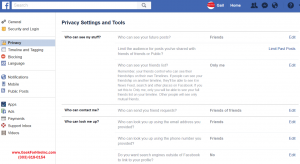Lately Chris has been forwarding articles to me about online and Facebook privacy. Now, if you’ve been reading this blog for awhile, I know you know that I don’t think anything is private on the internet. These articles seem to solidify my opinion. The story that piqued my interest early this week was this one in Gizmodo. In this case you had people who had to keep a part of their identity secret, so they have set up a separate online identity. So they have a different emails, phone numbers, social media, etc., which may be connected to each other, but are not in any way connected to their “real” identity. In this case, the people are sex workers, but they could just as easily be someone who was in an abusive relationship or another situation that requires real-life, general online, and specifically, Facebook privacy.
Here are some excerpts from that article:
“Her “real identity”—the public one, who lives in California, uses an academic email address, and posts about politics—joined Facebook in 2011. Her sex-work identity is not on the social network at all; for it, she uses a different email address, a different phone number, and a different name. Yet earlier this year, looking at Facebook’s “People You May Know” recommendations, Leila (a name I’m using using in place of either of the names she uses) was shocked to see some of her regular sex-work clients.
“Despite the fact that she’d only given Facebook information from her vanilla identity, the company had somehow discerned her real-world connection to these people—and, even more horrifyingly, her account was potentially being presented to them as a friend suggestion too, outing her regular identity to them.”
and:
“Darling used to have a second, private account under her legal name for connecting with people she knew in her normal, vanilla life, but it was getting recommended to her fans, revealing her “real” identity to them. Some of them began harassing her and trying to track down her family.
“We’re living in an age where you can weaponize personal information against people,” Darling said. She’s not sure how Facebook linked her porn identity to her legal identity, but it meant one had to go. She deleted her private account a few years ago, leaving only her public, porn one.”
You might think that, as people who have chosen an alternative career and life style, that they somehow “deserve” to be outed. But imagine if you had an ex-spouse who had been stalking you and a restraining order wasn’t working.
Facebook Privacy How To:
Here are some suggestions if you need to keep your identity secret, but still want to use Facebook:
- Set your posts to “Friends Only”, and don’t tag anyone in your status. (When you tag other people, then their friends can see your post as well.)
- Don’t allow other people to post on your page, and, if they tag you in a post, make sure you approve (or not) it before it posts.
- Make sure any personal information stays private. Don’t allow Facebook to share your birthday, phone number, email, etc. –
- You should also lock down your Online Facebook Privacy Settings
- Finally, all of these options are available to you under Facebook Settings.
Other Strategies:
- Because people can recognize your face, make sure there are no photos of you on your account. Use a beautiful photo or a meme or cartoon to represent your profile picture.
- After a post has been up for a week or so, consider changing the privacy level to “only me”. You’ll keep a historical record of what you posted and who commented, but it will be invisible to everyone else.
Are there other strategies you’re using to manage your Facebook privacy? Please share those in the comments!
Chris Eddy of Geek For Hire, Inc. has been providing computer service to families and small businesses with Mac’s and PC’s for the past fifteen years. His company is highly rated by both the BBB (Better Business Bureau) and by Angie’s List. You can find more on our website, or give us a call 303-618-0154. Geek For Hire, Inc. provides onsite service (Tier 3) to the Denver / Boulder / Front Range area as well as remote service throughout North America.
We’ve been using Amazon Prime for the past few years. We like the free 2-3 day shipping and the online streaming. I haven’t tried the Kindle lending library yet. I’ll try that next! Prime is normally $99/year, but you can try it for 30 day for free by clicking on this link: Try Amazon Prime 30-Day Free Trial (Yes, we’ll get a small commission if you check it out.)